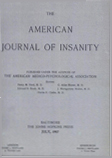PROGNOSTIC CRITERIA IN DEMENTIA PARALYTICA
Abstract
1. One hundred cases of dementia paralytica treated at the Worcester State Hospital between the years 1925-1938 were studied to determine criteria useful in the prognosis. An inquiry into the cause of failure of one-half to two-thirds of paretics to undergo remission under pyretotherapy was also undertaken.
2. These patients were treated by one of four methods: malaria, standard diathermy, modified diathermy and tryparsamide. Thirty-three per cent of the total group underwent remission.
3. The following criteria are found to be of value in the determination of the prognosis: age of the patient, duration of the paretic process, previous therapy, extent of neurological dysfunction, history of epileptiform seizures, degree of defects in sensorium, tendency toward spontaneous remission, type of psychopathology exhibited, and degree of adjustment of the preparetic personality.
4. Most important prognostic criterion is the degree of adjustment in the preparetic personality. All of the patients with well- integrated personalities prior to the onset of dementia paralytica underwent remission no matter what type of therapy they were given. Only three out of 63 patients with poorly adjusted personalities experienced remission.
5. Of the other criteria, the most significant are the extent of neurological dysfunction, degree of defect in sensorium and type of psychopathology. Patients in the delirious, apathetic and agitated groups had the best prognosis, those in the demented and schizophreniform the worst.
6. There is found to be a strong correlation between the degree of adjustment in the preparetic personality and the other prognostic criteria. Well-integrated individuals tended to have milder neurological and sensorium defects, slower progress of symptomatology before therapy, and a tendency to spontaneous remission as well as a better prognosis.
7. Three cases of dementia paralytica are cited to show how a relatively accurate prognosis can be formulated.
8. Causes for the greater resistance to the progress of the paretic process and the better response to therapy in the previously well- integrated individual are discussed.
Access content
To read the fulltext, please use one of the options below to sign in or purchase access.- Personal login
- Institutional Login
- Sign in via OpenAthens
- Register for access
-
Please login/register if you wish to pair your device and check access availability.
Not a subscriber?
PsychiatryOnline subscription options offer access to the DSM-5 library, books, journals, CME, and patient resources. This all-in-one virtual library provides psychiatrists and mental health professionals with key resources for diagnosis, treatment, research, and professional development.
Need more help? PsychiatryOnline Customer Service may be reached by emailing [email protected] or by calling 800-368-5777 (in the U.S.) or 703-907-7322 (outside the U.S.).



